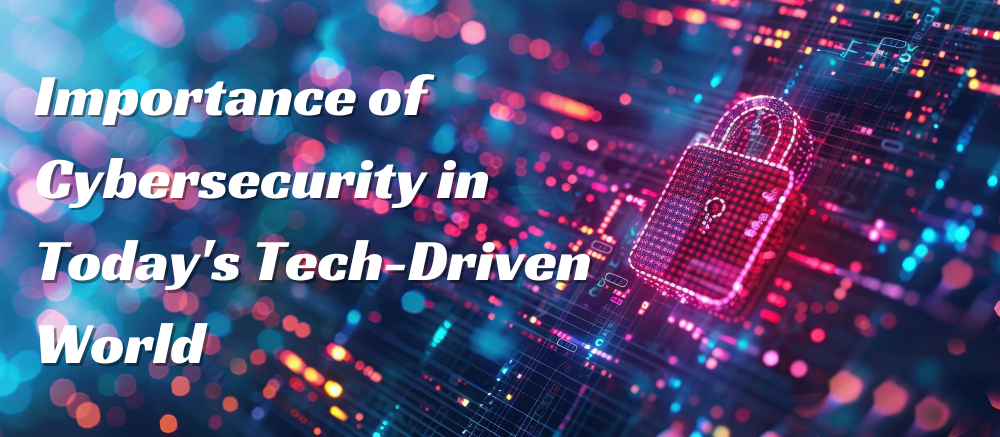Cybersecurity has become a paramount concern in an era where technology permeates every aspect of our lives. As we increasingly rely on digital platforms for communication, banking, shopping, and even healthcare, the threat of cyberattacks grows.
Cybersecurity is not just about protecting sensitive information; it’s about ensuring the integrity and functionality of the systems that support our daily lives.
This article delves into the critical importance of cybersecurity in our tech-driven world, highlighting the role of higher education in bolstering our defences and exploring the implications of inadequate cybersecurity measures.
The Growing Threat Landscape
From phishing attacks and ransomware to data breaches and cyber espionage, the variety of threats is staggering.
One of the most concerning aspects of cyber threats is their potential to disrupt critical infrastructure. Cyberattack targets include power grids, water supply systems, and healthcare facilities.
A successful attack on any of these systems can have catastrophic consequences, affecting not just individual organizations but entire communities.
The Role of Education in Enhancing Cybersecurity
As the threat landscape evolves, so too must our defences. One of the most effective ways to bolster cybersecurity is through education. Higher education institutions play a crucial role in preparing the next generation of cybersecurity professionals.
By offering specialized programs and courses, these institutions equip students with the skills and knowledge needed to combat cyber threats effectively.
Pursuing higher education in cybersecurity, such as an online master’s cybersecurity program, provides individuals with a comprehensive understanding of the field. These programs cover many topics, including network security, cryptography, ethical hacking, and digital forensics.
Students learn to identify vulnerabilities, develop secure systems, and respond to cyber incidents. The flexibility of online programs makes them accessible to a broader audience, allowing working professionals to enhance their skills without interrupting their careers.
Organizations across all sectors are seeking skilled individuals to protect their digital assets. By pursuing advanced education in cybersecurity, individuals can position themselves for lucrative career opportunities.
Moreover, a well-educated cybersecurity workforce is essential for national security. Governments and critical infrastructure providers rely on skilled professionals to defend against cyber threats.
Higher education institutions also play a role in advancing cybersecurity research. Faculty and students collaborate on cutting-edge research projects, exploring new techniques and technologies to enhance cybersecurity.
This research is vital for staying ahead of cybercriminals and developing innovative solutions to emerging threats. By fostering a culture of continuous learning and research, higher education institutions contribute to improving cybersecurity practices.
Implications of Inadequate Cybersecurity Measures
Organizations that fail to implement robust security protocols are at risk of cyberattacks, which can result in significant financial losses, reputational damage, and legal liabilities.
For instance, data breaches can expose sensitive customer information, leading to identity theft and financial fraud. The affected organization may face hefty fines and legal actions from regulators and affected individuals.
Inadequate cybersecurity can also undermine customer trust. Consumers expect their personal information to be protected when they engage with businesses online. A single security breach can erode trust and drive customers away.
In a competitive market, maintaining customer trust is essential for business success. Therefore, investing in cybersecurity is not just a technical requirement but a business imperative.
The implications of poor cybersecurity extend beyond the business world. On a national level, inadequate cybersecurity can compromise national security. State-sponsored cyberattacks are becoming more common, with adversaries targeting government agencies, defence contractors, and critical infrastructure.
A successful cyberattack on a national scale can disrupt essential services, weaken national defences, and compromise sensitive information. Governments must prioritize cybersecurity to safeguard their citizens and maintain national sovereignty.
Moreover, inadequate cybersecurity can stifle innovation. Fear of cyberattacks can deter organizations from adopting new technologies and digital transformation initiatives. This hesitation can hinder progress and limit the potential benefits of technological advancements.
By contrast, robust cybersecurity measures can instil confidence and encourage innovation, driving economic growth and technological development.
The Importance of Cybersecurity Policies and Practices
Cybersecurity is not solely the responsibility of individual professionals or IT departments; it requires a comprehensive approach that includes well-defined policies and practices.
These policies serve as a foundation for establishing a secure environment and ensuring that all members of an organization understand their roles in maintaining security.
Effective cybersecurity policies encompass a variety of elements, including access control, data protection, and incident response procedures. Access control policies specify who can access specific data and systems based on their roles and responsibilities.
By limiting access to only those who need it, organizations can reduce the risk of unauthorized access and potential breaches. Regular audits and reviews of access controls are crucial to ensure they remain practical and up-to-date.
Data protection policies are equally important. These policies outline how sensitive information should be handled, stored, and transmitted. Encryption, for example, is a common practice that protects data by making it unreadable to unauthorized users.
Regular data backups are another critical practice, ensuring data can be restored during a cyber incident. Moreover, these policies should comply with relevant regulations and standards, such as GDPR or HIPAA, to avoid legal repercussions.
Conclusion
In today’s tech-driven world, cybersecurity is of paramount importance. The growing threat landscape, characterized by sophisticated cybercriminals and expanding attack surfaces, demands robust security measures.
Higher education institutions play a vital role in preparing cybersecurity professionals and advancing research in the field.
The implications of inadequate cybersecurity measures are severe, affecting organizations, consumers, and national security. Cybersecurity is essential for protecting digital assets, maintaining customer trust, and safeguarding national interests.
